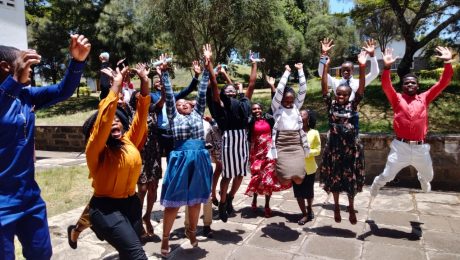What is Salvation?
Salvation refers to deliverance from eternal death which is the punishment for sin. We get saved when we put our faith in Jesus Christ, the Son of God who was crucified for our sins and who rose from dead (resurrected) so that we may have eternal life.
All men are sinners
Men here refers to all humanity. We are inherently sinful people. There is not one of us who on his own is righteous (Romans 3:10-18). All have sinned and fall short of the glory of God (Romans 3:23). We inherit this nature from the first man, Adam, who together with his wife Eve sinned by going against God’s command (Genesis 3:6-7). This is what the Bible refers to when it says, “Therefore, just as sin entered the world through one mans, and death through sin, and in this way death came to all people, because all sinned.” (Romans 5:12)
Sin separates us from God and puts us in conflict with one another
When Adam and Eve sinned against God and their nakedness was exposed, their relationship with God was broken and they were banished from the garden of Eden (Genesis 3:8,23). Their own relationship was tainted when they passed blame to each other and to the serpent. This is what we see happening in our lives today. We reject God and instead live unholy and unrighteous lives with habits, thoughts, attitudes and acts that God has commanded us not to engage in. These include sexual immorality, greed, theft, anger, jealousy, selfishness, hatred, murder, etc. The Bible calls these the acts of the sinful nature and makes it clear that those who live like this will not inherit the Kingdom of God (Galatians 5:19-21).
We are unable to save ourselves
Apart from God’s grace, we are powerless against sin. We are dead in sin (Ephesians 2:1). God is just and this means that he punishes all sin. However, God’s mercy has triumphed over judgement (James 2:13). Just as he made garments of skin for Adam and Eve to cover their nakedness (Genesis 3:21), so has he given his Son, Jesus Christ, to die for our sins (John 3:16). This is the expression of God’s great love for us (Romans 5:8, Ephesians 2:4). We are saved by grace through faith in Jesus Christ (Ephesians 2:8). Jesus Christ became sin for us so that in him we might become the righteousness of God (2 Corinthians 6:21).
How can I get saved?
We get saved when we put our faith (trust and assurance) in God through Jesus Christ. This faith leads us to declare with our mouths that Jesus is Lord, and to believe in our hearts that God raised him from the dead (Romans 10:9). This faith also results in repentance of all sin. Repentance means turning (leaving behind, changing direction, resolving) from a life of sin to a life of righteousness through Christ. When we confess our sins and put our faith in Jesus Christ, we are accepted by God as his own (John 1:12, Romans 8:1-2, 1 John 1:9).
God’s grace is not without effect
God’s mercy and grace is a gift that enables us to live righteously and not a license to sin. Continuing in sin after you have received the gift of God’s salvation is offensive to God. The Bible describes it as “a dog going back to its own vomit” or “a pig that is washed returning to wallowing in the mud” (2 Peter 2:22). The grace of God is not without effect (1 Corinthians 15:10). This grace teaches us to say no to all forms of ungodliness and worldly passions and to live self-controlled, upright and godly lives in this present age (Titus 2:12). We ought to bear much fruit by remaining in Jesus Christ (John 15:8).
A prayer response
Prayer is the means God has provided for us to commune with him. If you truly desire to turn away from a sinful life and if you believe that Jesus Christ is the true Son of God and saviour of all men, please pray to God, confess your sins and thank him for his great salvation. You can use the prayer below
Dear God, I come to you in recognition of my sin which has separated me from you and caused me misery. I believe that you sent your Son Jesus Christ to die for me on the cross that I may be saved. I confess now my sins before you (mention as many as come to mind). I plead for your forgiveness and I thank you for the gift of faith and salvation which are mine now. Thank you God, my Father and Lord. Help me to live a life that is worthy of you from this day forward until you return or call me home. In Jesus’ name, Amen.
You may contact us for further prayer, counselling or for any question regarding salvation
Phone number: 0724 997 054
Email: [email protected]
It is a rather difficult time for any graduate to be engaging transition from campus to the job market. Some have been gripped by fear and wallow in hopelessness wondering how life will be and how soon we will get back to normalcy. Just when we thought we were almost done with the devastating effects of COVID-19 pandemic, a third wave swung in exacerbating the cries and worries of many fresh graduates. With institutions of learning been shut down twice, it is uncertain when finalists will complete their studies. COVID-19 pandemic brought about an economic standstill that has threatened the livelihoods of many Kenyans. Many businesses, organizations and industries were shut down thus making people lose their jobs indefinitely. With thousands of graduates unemployed, these events pose a serious crisis to unemployment among the youths. The pangs of these realities are affecting many fresh graduates leaving many hopeless, depressed and disappointed with life.
The journey from the familiar to unfamiliar for Abraham was rather difficult when God called Him, Genesis 12. Abraham, left all that was familiar to him; his family, society, country and even religion and set out on a journey with God. As we step out from college, we too are called to forsake the familiar school life to embrace something new. Abraham steps out in faith only to find his path packed with trials. He encountered wars and doubts before he got to the promised land. At one point he had to go to Egypt because the very land God had told him he will possess is smitten by drought. It took 25 years for Abraham to behold in his hand the promised son.
Cruising Forward
God remains unchanging and faithful even in our doubts and faithlessness. He remains sure even in uncertainty and since we can trust him. We can journey through transition with great hope and anticipation in a loving God who is sovereign and changeless. The process may be full of uncertainty yet we trust God’s leading and guidance even in the unfamiliar road.
Things may be tough, but we don’t have to be stuck. We need to get on the sail and cruise forward albeit there are many uncertainties. But how do we move on? With total trust and continual fellowship with the Lord, God guided Abraham’s every step till he reached the Promised Land. This journey requires us to trust the unchanging God in this changing times.
God has given something unique to all of us. What can you do with your hands or mind? How can you occupy your time with meaningful tasks? Can you grow some vegetables or crops, do entrepreneurship, learn a new skill, enroll for an online course or volunteer your services at a local organization, church or industry? Consider what options you can access and be keen to give your best at them. Whatever your hand finds to do, do it as unto the Lord and not to man. The resilience in prayer and pursuit of engagements you are passionate about is worth the investment. Do it diligently. Start right where you are and keep moving. We shall overcome.
The context of the tides: the COVID exile
Psalm 137 was written many years into the Babylonian exile. The Jews were away from their homeland, with the harsh reality of being geographically displaced. Probably worse than that was the unpleasant impact that the exile had in their loss of the structured, reliable world which provided them with meaning. Exile was not just geographical, it was a social, moral, cultural, liturgical and spiritual issue.
In Verse 1 they say ‘By the rivers of Babylon we sat and wept when we remembered Zion. They wept over the death of so many loved ones, the loss of almost everything they owned, the destruction of Jerusalem and the temple. They even wept at the brutality of their captors. What did the future hold as well? The book of Lamentations gives a snapshot reflection of what it felt like to live through the tragedy of Jerusalem’s destruction and the people’s exile in Babylon. Being in exile challenged their fundamental core; there was a crisis of faith; how can God be worshiped without a temple?
Like in exile people are weeping over the restrictions on fellowship and movement. The containment measures to test and trace the contacts and the virus, the growing mental health issues amplified by the stress of lockdown are a destabilization to our wellness. On top of that, we grapple with the reeling economic crisis. The ‘new normal’ which is an offset, now includes wearing of marks, social distancing, remote learning and working.
There are a lot of changing dynamics of ministry, many limitations, and a lot of uncertainty of what the future holds. Just like the exiles, this remains a legitimate question; how can we sing the Lord’s song in a foreign land? What does godly leadership mean in such a context? In such a situation of exiled faith, exiled student life, exiled ministry and generally exiled life, the tides can threaten us. I see 3 major tides that we need to be aware of.
a) The Tide of Fear
For the exiles, there was a multitude of fears. Lamentations reveal Judah’s pathetic condition as a dishonored people at the hands of the Babylonians. They feared their captors, the torment, and their broken relationship with God, etc. Likewise, COVID-19 has increased anxiety among us. We are afraid of situations, the unanswered questions, and phobia of contracting the virus.
b) The Tide of Discouragement
The exiles suffered from mockery according to Verses 2 and 3: “There on the poplars we hung our harps, for there our captors asked us for songs, our tormentors demanded songs of joy; they said, “Sing us one of the songs of Zion!” What cruelty to make a people cry, and then require them to sing! What a discouraging situation!
Discouragement is a sense of defeat and hopelessness. It has the cumulative effect of sapping us of energy and vision. We get more discouraged when the conditions prolong. The fatigue leaves us vulnerable to more pain. It is often as though many things have conspired to discourage us.
c) The Tide of Unbelief
Unbelief dares to question the truthfulness of God. In unbelief we become shaky about God’s promises. For the exiles, many lost their faith in Yahweh, unable to understand how their exile related to their belief that Yahweh was their protector, the one who fought for them. How could Jerusalem the Holy City fall to a heathen king? Could God not have delivered them? This tide of unbelief can harden our hearts, fill us with presumption and create impatience, and potentially fuel false teachings.
RISING ABOVE THE TIDES
How would one arise above the tides that comes with such situations? Scriptures offers us a very rich admonition for our consideration. In Acts 20:28, the Bible says, ‘keep watch over yourselves and all the flock of which the Holy Spirit has made you overseers.’ Two lessons can be learned from this scripture;
a) Practice shepherd care; Keep watch over yourselves
You need to work diligently towards a healthy heart and mind. Be in touch with God through prayer and Bible study. You must highly esteem God’s word and by it, guard your heart. Romans 12:2 affirms this ‘Do not conform to the pattern of this world, but be transformed by the renewing of your mind. Then you will be able to test and approve what God’s will is-his good, pleasing and perfect will’.
Work diligently towards healthy habits for your physical body including; rest, sleep, regular exercise and healthy diet. Avoid being like Prophet Elijah in 1 Kings 19: When he was worn out, because of ministry, the Lord made him sleep for a day, then eat and then go back to sleep. instead, consider the model in Mark 6:31; Jesus said to them, `Come away with me. Let us go alone to a quiet place and rest for a while.’
Diligently cultivate a healthy attitude. You will need Christian ‘Emotional intelligence’ where you understand, use, and manage your own emotions in positive ways. You will need it to deal with stress and communicate effectively in these difficult times. You will need it to effectively empathize with others.
b) Practice sheep care: Keep watch over all the flock
1 Peter 5:2 Be shepherds of God’s flock that is under your care, watching over them—not because you must, but because you are willing, as God wants you to be; not pursuing dishonest gain, but eager to serve.
The sheep belong to God. Recognize what you can do, and what only God can do. Someone said, ‘You do not have to die on every cross you see.’ God knows the sheep, He is sovereign, and He is in control. The perspective affects also your attitude as well as practice.
A shepherd’s primary responsibility is the safety and welfare of the flock. Leading, feeding and protecting the sheep is no easy task especially compounded by the Corona exile realities. Ultimately you should say to the flock, “Follow me as I follow Christ” 1 Corinthians 1:11, and then faithfully follow the example of servant leadership as shown in Christ.
Even in this Corona-exile we will rise above the tides as we look to the God whom the Psalmist said:
“You rule the raging of the sea; when its waves rise, you still them”. Psalm 89:9
The humiliation and public crucifixion of Jesus the Lord that fateful Friday was the height of ‘victory’ for the Jews and their authorities. On the contrary, no amount of words could sufficiently explain the grief, discouragement, and defeat the disciples experienced. Then came this morning of the first day of the week and the grant pronouncement at the tomb: “He is not here; he has risen, just as he said. Come and see the place where he lay,” Matt. 28:6. Tables turned.
It couldn’t have been a hoax
Despite the numerous objections that have been leveled against the bodily resurrection of the Lord Jesus (the swoon, twin, hallucination the wrong tomb theories), not a single one of these has been weighty enough. History could have recorded Jesus’ whereabouts after a miraculous escape from the cross or if someone had helped him down as claimed; the Jewish authorities could have easily produced his body if the women had simply missed his tomb and that would have been the last nail on the coffin. It also doesn’t beat logic that the disciples underwent such grave persecution knowing very well that they had stolen the body or that the resurrection was just a hoax to protect the claims of their dead master. Rarely do people die for such lies.
Three implications
The implication of the bodily resurrection of Jesus are profound. First, it offers an equivocal confirmation to the claims of Jesus. Such include his claims as the Son of God; the way, the truth and the life; one with the Father and in whose blood is the forgiveness of all sins (John 3:35; 14:6, 11; Matt. 26:28). Secondly, the resurrection is the cornerstone of Christianity. As Dr. William Craig, the professor of Philosophy at Talbot School of Theology says, “Without the belief in the resurrection the Christian faith could not have come into being. The disciples would have remained crushed and defeated men…” On the contrary, the resurrection was a humongous occurrence that shaped the Jews’ social structure in notable ways- thousands gave up animal sacrifices, the keeping of the Law of Moses and even the keeping of the Sabbath. It was now the Lord’s day! Thirdly, on the basis of the truth of the resurrection, all objections, counter faiths and religions fall flat on the face.
The Heart of the Gospel
The resurrection thus, becomes the heart of the Gospel for, ‘If you declare with your mouth, “Jesus is Lord,” and believe in your heart that God raised him from the dead, you will be saved. (Romans 10:9). In the resurrection we have a living hope (1 Peter 1: 3-4); without the resurrection, our faith is futile, we are still in our sins… we are of all people most to be pitied! (1 Corinthians 15: 16-19). On his conclusion on ‘the Evidence for Resurrection,’ C.S Lewis says, “If our conclusion in the case for Christ is correct, your future in eternity hinges on how you respond to Christ (John 8:24).” He is risen, thank God for the resurrection!





